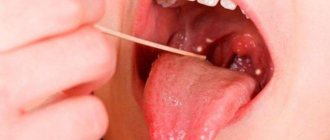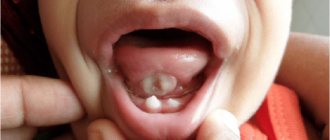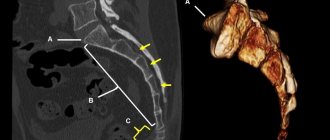We are used to the fact that we need to go to the dentist if we have problems with our teeth or gums. What to do if you have inflammation of the tongue or glossitis? Dentists identify more than 10 types and subtypes of infection. The infection can be caused by both fungus and bacteria. Viral infection is less common. Inflammation can be caused by a lack of certain vitamins and minerals, or hormonal changes. There are many reasons for the disease, so it is important to identify what exactly caused the inflammatory process.
Causes of glossitis
- improper oral hygiene;
- bacterial infection;
- fungal infection;
- heavy metal poisoning;
- bad habits (smoking, alcoholism);
- congenital pathologies of the tongue (folded tongue);
- allergic reaction;
- tongue injury (often caused by malocclusion);
- oral infections;
- lack of iron in the body;
- burn of the mucous membrane (hot food or drinks);
- infectious diseases (AIDS, tuberculosis, scarlet fever, measles).
Causes of Burning Mouth Syndrome
This condition may be associated with any general somatic or dental disease, or it may occur on its own. As a rule, burning mouth syndrome is a condition in which its source is unknown. It occurs spontaneously, and the patient cannot indicate the cause or trigger for the complaint.
There are several theories about the development of this pathology, but none of them have yet been proven. Researchers of this problem have made several assumptions as a theory of the origin of the syndrome. One of the most common is the theory of sex hormone deficiency, since complaints of chronic burning of the tongue are often made by pre- or postmenopausal women. True, when checking studies in this area, reliable statistical significance was not established, but, nevertheless, as a theory, this reason is supported by many practitioners [3].
“Among patients with burning mouth syndrome, women were more common. According to some studies, there were 10.3 times more women with complaints typical of this condition than men.”
Saperkin N.V., Ph.D., Associate Professor of the Department of Epidemiology, Microbiology and Evidence-Based Medicine PIMU [1]
There is an assumption that certain autoimmune processes, especially those that occur in old age, may also be background for the occurrence of burning mouth syndrome [2].
It is possible that this disease occurs in people with neurological or mental disorders, depression. But this is also not the leading theory, since there are studies indicating that it was not depression that led to the onset of the syndrome, but on the contrary, burning mouth syndrome became one of the reasons for the development of a depressive episode. The same spectrum of causes of burning in the mouth includes cancerophobia, especially in people who have quit smoking and are afraid of developing cancer of the lip or tongue, as well as in people with a fear of household transmission of STDs [2].
Injuries can lead to the syndrome, including those not noticed by a person, associated with his habits, congenital or due to pathologies with malocclusion, dental anomalies. Some researchers note that individual changes in the sensitivity and density of the oral mucosa can lead to the development of glossopyrosis. A correlation has been noted between mental lability and increased sensitivity of taste buds: in such people, the incidence of burning mouth syndrome was higher. In general, the approximate list of conditions and diseases in which the syndrome may appear is quite wide [3].
- In women, there is a deficiency of estrogen or progesterone.
- Autoimmune pathology.
- Neurological disorders, PTSD.
- Psychiatric disorders.
- Chronic irritation of the mouth, such as from improper dentures.
- Sensory defects.
Diseases that may cause a burning sensation in the mouth:
- Anemia.
- Parkinson's disease.
- Deficiency of B vitamins, zinc.
- Neuropathy.
- Hypothyroidism.
- Taking medications.
- Diabetes mellitus type 2.
- Sjögren's syndrome with xerostomia.
- Candidiasis of the oral mucosa, esophagus.
- Herpes.
- Cracked tongue.
- Allergies, including contact ones.
- Hiatal hernia.
- HIV.
- Myeloma.
- Oncological diseases [3].
The most common types of glossitis
The most common occurrences in dental practice are:
- acute catarrhal glossitis;
- tongue abscess;
- desquamative glossitis.
Acute catarrhal glossitis is the most common type of inflammation. Inflammation can be caused by microbes or mechanical damage to the tongue. The predominant symptoms are pain, redness and swelling.
A tongue abscess is the appearance of an abscess in the tongue. The abscess can be superficial, under the mucous membrane, or maybe in the thickness of the tongue. Abscesses in the thickness of the tongue, in addition to pain in the tongue, can cause a disturbance in the general condition. A person develops a fever, a headache, and weakness. Most often occurs due to injury to the tongue.
Desquamative glossitis, also known as “geographic tongue,” most often appears in children. It appears in the form of various spots on the tongue, which look like a white coating, alternating with areas of pink mucous membrane. There are no changes other than appearance. Scientists have identified a clear reason for it. The main factors are believed to be bacteria, allergic reactions and hormonal imbalances.
Treatment of a burn to the oral cavity in a child
According to statistics, a large percentage of patients who turn to a doctor for help as a result of a burn to the mouth or tongue are children. Young patients up to a year and older can unknowingly “taste” household chemicals or alcoholic drinks accidentally left on the table by their parents. Also common causes of burns are eating too hot food.
The mucous membrane of a child’s tongue is more delicate and thin, and therefore requires more delicate handling in case of a burn. For treatment, you must urgently contact a pediatric dentist.
Symptoms of glossitis
- increased salivation;
- swelling and redness;
- pain and burning when eating;
- plaque on the tongue in the form of spots;
- bad breath;
- papillomas or warts on the tongue;
- speech disorder;
- foreign body sensation.
Prevention of glossitis - high-quality oral hygiene and no bad habits. It is important to undergo timely preventive examinations and also eat well. All these factors actively contribute to the development of the disease and bring a number of problems.
Burning tongue. Possible reasons
The causes may be congenital or acquired, associated with infections, intoxications, injuries to the nervous system and disorders of its blood supply, psychogenic, caused by a lack of vitamin PP in intestinal diseases.
A burning sensation of the tongue is often observed with arthrosis of the temporomandibular joint.
Glossalgia can occur with malocclusion, with sharp edges of teeth and dentures, fillings and dentures made of different metals, after traumatic tooth extraction.
Burning syndrome in the mouth is observed in chronic gastritis with secretory insufficiency (reduced gastric secretion), intestinal diseases (enteritis, colitis), and diseases of the liver and biliary tract. Treating these conditions can significantly reduce burning mouth syndrome.
Most often, this syndrome is observed in women aged 50–60 years. The main signs of burning mouth syndrome are the following sensations:
- tingling,
- tingling,
- pressure,
- numbness,
- burning tongue,
In this case, there is a coating on the surface of the tongue and dry mouth.
Treatment of glossitis
A specialist must make an accurate diagnosis and identify the cause of the disease. If you suspect that you have glossitis , and all symptoms indicate this, contact your dental clinic. This is the only way to create the right treatment plan and provide timely assistance. Quite often in such cases, doctors prescribe antibiotics, anti-inflammatory drugs and rinsing the mouth with special antiseptic solutions. In advanced stages, glossitis is treated surgically. Deep abscesses must be opened in the maxillofacial department. Under no circumstances should you take medications without a doctor’s recommendation.
You can cure glossitis, caries or any other diseases of the oral cavity right in your sleep. Family Dentistry Center "Medexpert" provides dental treatment under medicinal sedation. Thanks to this approach, the patient falls into a healthy sleep, ceases to feel pain and discomfort, while the vital functions of the body remain unchanged. Sedation is widely used in pediatric dentistry and even helps fight dental phobia. Dental treatment can be comfortable and painless - tested for yourself.
Treatment of burning sensation in the mouth
Therapeutic nutrition, exclusion of spicy and irritating foods.
- After consultation with a dentist, elimination of foci of pathological impulses in the oral cavity from the dentofacial system.
- Normalization of the tone of the autonomic nervous system:
- preparations of valerian, motherwort, bellataminal, etc.,
- tissue metabolism stimulants - courses of B vitamins (B1, B6, B12),
- nootropic drugs, depending on the nature of the neuropsychic disorders (tranquilizers, antidepressants and other drugs that improve blood supply to the brain and oral tissues). The course of treatment must be carried out after consultation with a neurologist.
- Local remedies: applications to the tongue of a 2% novocaine solution, 10% lidocaine solution, rinsing with propolis, herbal infusion.
- In some cases, physiotherapy is used - electrophoresis on the solar plexus and cervical autonomic nodes, hirudotherapy from a specialist.
How to treat a burning tongue sensation
The first thing to do if pain in the tongue occurs is to consult a specialist. It is advisable to go to a therapist, and not to a dentist, as many do. It is extremely rare that pain in the tongue area indicates problems with oral health. You should only go to the dentist if a burning sensation occurs after dental treatment, or if other symptoms indicating dental problems are observed at the same time.
Usually, an examination and anamnesis are sufficient to identify the root cause of an unpleasant symptom. Only in rare cases is it necessary to do additional tests.
When the clinical picture becomes clear, the doctor will prescribe treatment. The speech organ itself is usually not given special attention; treatment should be aimed at eliminating the cause of the sensation of a burned tongue :
- In case of fungal or infectious infection, antibiotics are prescribed. In addition to these, the specialist selects products that protect the natural microflora of the oral cavity.
- For serious stomach problems, not only drug therapy is prescribed, but also a diet. In rare cases, hospitalization is required.
- The most difficult thing is the treatment of neurological diseases. When they are identified, the intervention of several doctors and serious therapy are required.
In all other cases, burning in the mouth can be eliminated through proper nutrition and giving up bad habits. In addition, you need to avoid stress and pay attention to oral hygiene.
How to get rid of pain at home
Some of the reasons why your tongue feels sore, feels like it's burned, and has a white coating on it indicate poor hygiene. In this case, to eliminate unpleasant symptoms, it is enough to regularly clean the oral cavity of food debris and bacteria. If discomfort does not go away after a few days, consult a doctor.
To relieve symptoms at home, you can resort to the following traditional methods of therapy:
- Use homemade antiseptic rinses to prevent infection. Such manipulations will be useful regardless of why the tongue began to hurt.
- If you are sure that you did not burn yourself, but the discomfort does not go away, rinse your mouth with a soothing infusion of chamomile or sage. In pharmacies you can even find special solutions for sensitive gums, which also relieve pain.
- If you feel the burning sensation is too strong, you can take a pain reliever. If you are pregnant, you should first consult your doctor.
- Drink more water, weak tea. During therapy, avoid soda and juices. Try to eliminate white sugar from your diet.
- Lollipops with mild flavors relieve discomfort. But if you abuse them, you can damage the mucous membrane of the mouth and tongue.
There were very few ways to get rid of discomfort similar to a tongue burn. In almost all cases, you will have to go to a specialist to find out how to treat the root cause of the pathology.
Possible diseases
Plaque and soreness of the tongue are not always associated with damage to this particular organ. Sometimes this is a consequence of pathologies of other systems.
Possible diseases:
- glossitis;
- oral candidiasis;
- gastroenteritis, peptic ulcer;
- damage to the nervous system;
- blockage of the salivary ducts;
- acute tonsillitis (tonsillitis);
- endocrine disorders (diabetes mellitus);
- autoimmune pathologies;
- infectious diseases (herpes, long-term tuberculosis, etc.);
- leukoplakia (characteristic of severe immunodeficiency).
Often a white coating and pain due to dry tongue accompany dehydration. In this case, the person urgently needs medical help.







